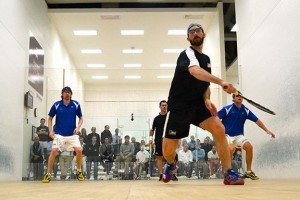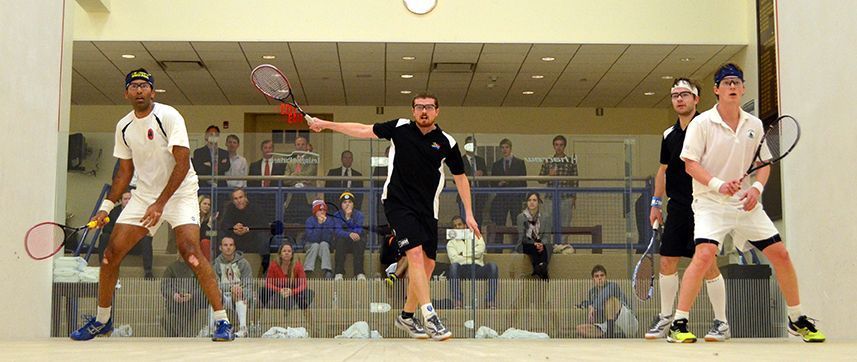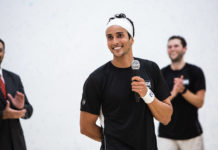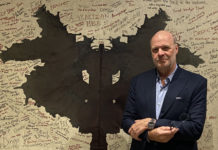
By Chris McClintick
Nearly a score of graduating classes played some part in the longest winning streak in college sports history—Trinity men’s squash: 252 consecutive victories, including thirteen national titles, from 1998 to 2012. While the world’s top juniors turned professional in their late teens, generations of the world’s best young U.S. and international recruits largely conceded the prospect of playing singles professionally in return for an undergraduate education in the U.S. After graduating, a few saw varied success on the professional singles tour, some players fell out of the game completely, and many applied their passion and talent for squash to give back to the game in the U.S. as coaches.
Fourteen Bantams, twelve of whom are from overseas, have adopted North American squash doubles as an outlet to keep competing at a high level on the Squash Doubles Association pro tour after graduating on top of full-time jobs inside and outside of the squash industry. With Yale coming in a not-so-close second with three graduates in the SDA top 50, Squash Magazine sheds light on Trinity’s considerable presence throughout the SDA pro tour.
The Trinity challenge match system was just as fiercely competitive as the team matches themselves according to Assaiante and the players. This competitive nature and desire for success on the squash court often left a void in many players’ lives upon graduating, which is one of the leading reasons for the number of Bantams on the SDA tour.
“I think for the guys that played squash at Trinity, squash was just part of their existence, part of their fiber,” Assaiante said. “For them, it wasn’t because it was an extracurricular activity, or because they were student athletes. Academics did come first, but squash was their haven. It wasn’t uncommon to find guys studying in the squash center rather than the library. It was just where they were, where they hung out. It was part of them. So when they graduate, that isn’t put down.
“When I recruited many of these international players, it didn’t occur to me that these players were going to be the ones teaching young players in the U.S., teaching our kids how to play the game, and that’s very cool,” Assaiante reflected.
“They’re definitely giving back, and that makes me very happy for them. They’ve exploded on the scene. In terms of the doubles game, they’re so talented, it’s such a natural rise for them as soon as they step on court. As soon as they learn that they can’t lay back in the court and that they need to move up and volley, then the game gets pretty easy for them.”
Of the fourteen Trinity alums in the SDA top fifty, ten are still involved in squash in some coaching capacity, while four work in the financial world. Just two had played hardball squash doubles before their freshman year at Trinity, while the rest picked up the game during their time at Trinity, or after graduating.

the 2014 Putnam Pro-Am against world No. 1’s Damien Mudge (far right) & Ben Gould (far left).
One of those who learned the game early on was Assaiante’s “greatest American recruit”, Preston Quick ‘00, who embodies U.S. squash doubles. Using the red, high-altitude hardball in his hometown of Denver, Colorado, Quick learned doubles playing with his father, Taylor, as an early teen. The father-son tandem would compete in tournaments at the Denver Athletic Club, where Quick was introduced to singles at a young age by the legendary Hashim Khan. At eighteen years old, Quick played his first professional doubles match as a qualifier in the Hashim Khan tournament at the DAC, and played a pro doubles qualifying match in at Apawamis Mike Bittner, a Trinity teammate.
At Trinity, Quick’s foundation in doubles helped yield an intercollegiate doubles national title in 1998 with Joe Pentland—the first of four consecutive years in which a Trinity player won an intercollegiate doubles title. After spending his first year out of school working at the Round Hill Club, Quick spent three years touring both the professional singles and doubles tours in the U.S. During this period, Quick won two national singles and two national doubles titles. Having reached world No. 95 on the singles tour, Quick stopped playing professional singles to become a professional at the Field Club of Greenwich. Quick continued his rise on the doubles tour and reached world No. 1 with Ben Gould. Quick’s life became even more doubles-oriented in 2011 when he became the Director of Doubles at US Squash. A year later, he became SDA tour manager.
“Trinity recruits great players from around the world and the U.S., and once done with college, they find they miss the competition,” Quick said. “The SDA tour is a perfect outlet without needing to train five hours a day as if you were on the PSA tour. I love to compete and, most importantly, at a high level. The SDA tour allows me to do that on a regular basis.”
After reaching world No. 1, Quick spent a season playing with fellow Bantam and England-native, Jonny Smith. Like Quick, Smith has been one of the mainstays on the professional doubles tour over the past decade. In 2005, Smith became the assistant professional at the University Club of New York. It was there, under the tutelage of doubles legend and University Club head professional, Damien Mudge, that Smith first played doubles.
“I was very fortunate to learn doubles first-hand from the extraordinary accomplishments and talents of Damien,” Smith recalls. “Hardball doubles is a very different game, with so many different aspects to learn and work on. To this day, I still feel like I am learning and trying to improve on different areas, even more so this season changing from the left wall to the right.”
Smith forged one of the strongest partnerships of the past year with another Bantam, Mike Ferreira, who graduated one year after Smith. After returning stateside from four years living in Hong Kong, Ferreira partnered with Trinity’s two-time collegiate individual champion, Baset Chaudhry, in the middle of the 2013-214 season. Together, Ferreira & Chaudhry reached the semifinals of the North American Open and Baltimore Cup as qualifiers, and ended the season by winning the Racquet & Tennis Club Challenger, which propelled the duo into the SDA top fifteen. Unfortunately for the partnership, Chaudhry moved on to a new job in finance, which hampered his ability to get time off to play on the tour, ultimately leading to the Ferreira & Smith partnership forming over the summer. Both Ferreira and Smith believe the bonds formed at Trinity, and the desire to compete at a high level, help explain the SDA Bantam contingent.
“One of the main strengths of Trinity is the sense of ‘family’ that Coach Assaiante has magically developed and builds upon with every season,” said Smith, who is now the head professional at the Union Club of New York. “This is not only felt within the current team, but it is also intertwined with alumni to make the connection stronger and richer.”
“Some of the reasons so many Trinity alums are playing on the tour are that they still enjoy competing, a high proportion of Trinity players are involved with squash who are good enough to be impactful on the tour, and therefore enjoy competing at a high level, and it’s an outlet to have fun with friends,” said Ferreira.
“Our challenge match system at Trinity was always very intense to see who plays on the team, and this intensity is also visible when Trinity teams play each other on the SDA,” Ferreira added. “However, we definitely cheer each other on in other matches, and still feel a large team camaraderie.”
In the current SDA rankings, only two teams are ranked higher than Ferreira & Smith: Australian world No. 1’s Damien Mudge & Ben Gould, and Trinity’s world No. 3 Yvain Badan and world No. 4 Manek Mathur. Doubles legend Peter Briggs introduced Badan to the game when the Swiss international became a teaching professional at the Apawamis Club.
After first playing competitively with Eric Vlcek, followed by a season with Jonny Smith, Badan recruited recent Trinity graduate Manek Mathur. Badan quickly became the seasoned doubles veteran in the partnership as he brought in the left-handed Indian shot-maker to complement his game. In an era dominated by Mudge & Gould, Mathur & Badan have grown to be one of the few teams able to present the Australian powerhouse a challenge. The tandem have already become the most successful all-Trinity team in history, and are showing no signs of slowing down. This season, Mathur & Badan have reached five finals, four of which have been against Mudge & Gould, including upsetting the perennial No. 1 tandem in the $40,000 Piedmont Driving Club Cup.
Badan credits the Trinity SDA presence to the consistent depth of Trinity’s teams relative to other schools during and after “The Streak.” The world No. 3 believes that because other teams have begun to recruit more, they have seen success in singles with Princeton and Harvard winning national titles in the past three seasons. On the intercollegiate doubles front, schools such as Navy and Rochester have won their first intercollegiate doubles titles. As a result, the collegiate complexion of the tour may change as younger talent seeps into the ranks.
“It’s going to be interesting in five or ten years, when all of this talent from all of the other schools begins to come together and each top team has nine to fifteen talented players,” Badan said. “Who knows what those kids are going to do after graduating, but I’m hopeful we’ll see some of them on the SDA tour.”





